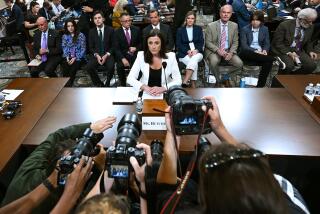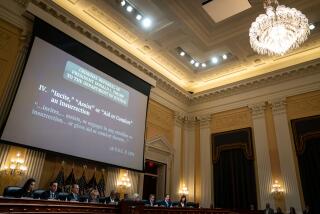THE IRAN--CONTRA HEARINGS : McFarlane Will Return Today to Rebut North
- Share via
WASHINGTON — Former National Security Adviser Robert C. McFarlane will be recalled to testify before the congressional investigating committees today to explain why his account of the Iran- contra affair differs so sharply from the story told by his one-time subordinate, Lt. Col. Oliver L. North.
Sen. Daniel K. Inouye (D-Hawaii), chairman of the Senate panel investigating the scandal, announced Monday that McFarlane had requested an opportunity to reappear before the committees to answer the many discrepancies between his testimony and that of North.
Inouye said the lawmakers will also hear today from James Radzinski, the former presidential aide who acted as custodian of the most top-secret White House documents--some of which were altered last November by North and his secretary, Fawn Hall.
While North has never criticized McFarlane by name, his testimony has seriously undermined the credibility of his former superior on such fundamental issues as whether McFarlane recommended halting the Iran arms sales shortly before he resigned his post in December, 1985, and was succeeded by Rear Adm. John M. Poindexter.
North said last Friday that he could not agree with the former national security adviser’s testimony that, after returning from a trip to London in November, 1985, in which he met Iranian representative Manucher Ghorbanifar, McFarlane advised the President against initiating direct U.S. arms sales to Tehran.
Failed to Achieve Goals
Moreover, North strongly hinted that McFarlane had altered his version of events simply because the arms sale to Iran had failed to achieve its goals.
“I would simply observe that, like some of my other activities, the opposition that I heard was far more muted while we were doing it than it ever was after it failed or after it was exposed,” North said.
“And I kind of get the feeling that there were a lot of people who were kind of willing to let it go along, hoping against hope that it would succeed, and willing to walk away when it failed,” he said.
McFarlane’s earlier testimony reflected a genuine fondness for North, whom he described as “probably the most mission-oriented, can-do professional” on his staff.
In 1986, in fact, he wrote to North: “If the world only knew how many times you have kept a semblance of gumption and integrity to U.S. policy, they would make you secretary of state.”
But North’s testimony, which is expected to conclude today, has demonstrated no reciprocal affection for McFarlane. Although he said he respected his former superior, North’s references to McFarlane contain none of the personal warmth that he clearly feels for others involved in the Iran-contra affair, such as middleman Richard V. Secord.
In their testimony, North and McFarlane disagreed on a number of other key points.
McFarlane said he was told by North last Nov. 21, as the Iran-contra affair was unraveling, that there would have to be a “shredding party.” Later that day, by his own admission, North shredded many White House documents pertaining to the affair.
Senate committee counsel Arthur L. Liman asked McFarlane during a session in May: “What did he tell you about a shredding party?”
McFarlane replied: “Just that there had to be one.”
Denies Use of Term
But North strongly denied that he ever used the term “shredding party” and rejected McFarlane’s claim that during the same conversation he suggested that there was reason to believe that Michael A. Ledeen, a White House consultant on U.S.-Israeli relations, had been accepting money from the government of Israel.
Likewise, North denied McFarlane’s contention that he frequently admonished members of the National Security Council staff, including North, against soliciting money from private citizens for the Nicaraguan resistance.
“I never heard it,” North said.
Nor could he recall that McFarlane, as he testified, had ruled that the NSC staff was subject to provisions of the Boland amendment, which prohibited all government intelligence agencies from providing military assistance to the contras.
“I don’t recall him saying that,” North said.
McFarlane said that he sometimes suspected that North was violating the amendment but that he never had any proof.
“I could not prove that it was violated, and I accepted Col. North’s personal certification that he had not done so,” McFarlane said. But he added: “It seemed to me that it was likely that he had . . . provided assistance to them that went beyond the law.”
North acknowledged that he had been supplying military assistance to the contras but insisted that the Boland amendment did not apply to the NSC staff.
Difference in Tone
There also was a remarkable difference in tone between the testimony of the two men. North admitted boldly that he lied to Congress and sought to cover up his involvement in the affair; McFarlane sought to shade the meaning of these actions, even though he took general responsibility for any wrongdoing by his staff during his tenure at the White House.
North and McFarlane both assured members of Congress in 1985 that the Administration was trying to observe the letter as well as the spirit of the Boland amendment. North testified that he knowingly misled Congress; McFarlane testified that their statement was perhaps “too categorical.”
In addition, both men were involved last November in drafting a false chronology of events, which failed to report that President Reagan had approved two Israeli shipments of U.S.-made arms to Iran in late 1985. North said he knew the chronology was false; McFarlane insisted that his memory was fuzzy on that point at the time the chronology was drafted.
More to Read
Get the L.A. Times Politics newsletter
Deeply reported insights into legislation, politics and policy from Sacramento, Washington and beyond. In your inbox twice per week.
You may occasionally receive promotional content from the Los Angeles Times.










